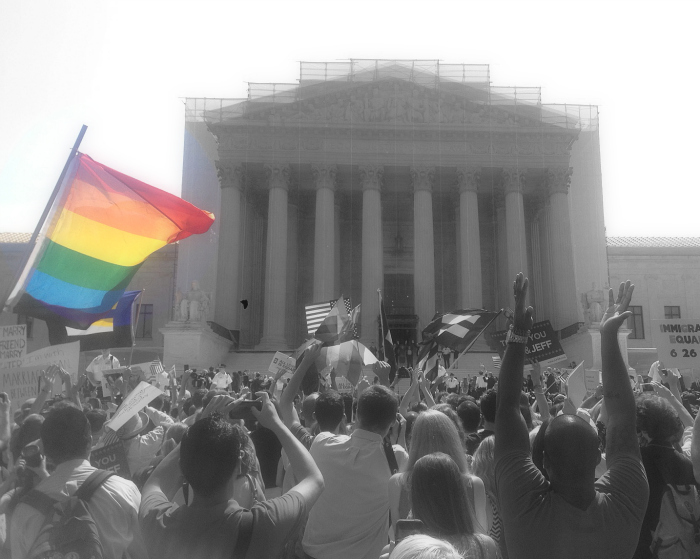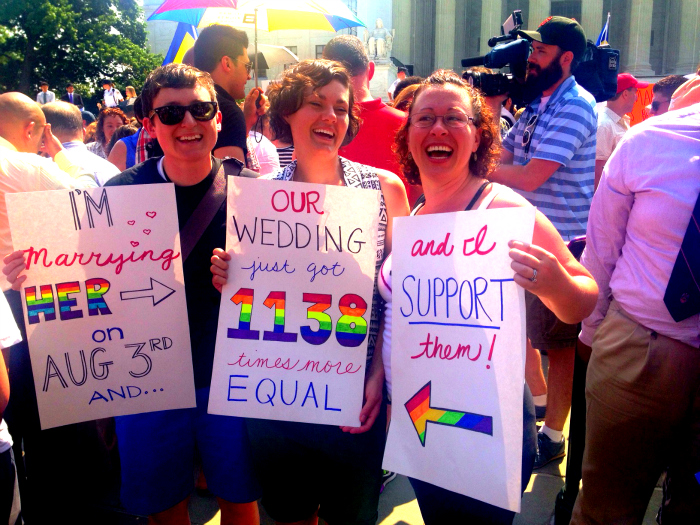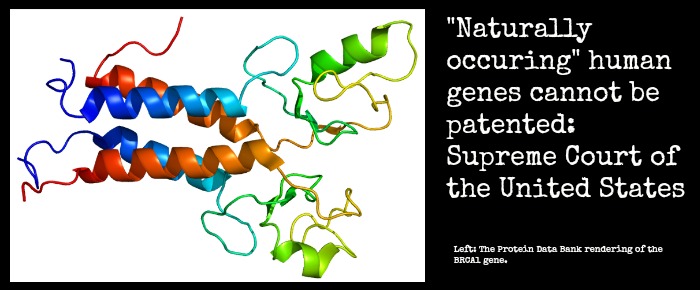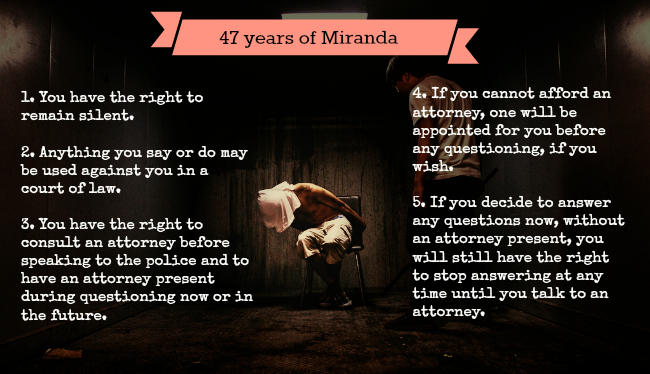Last week, on a hot and sultry June morning in Washington D.C., hundreds of people stood outside the U.S. Supreme Court’s neoclassical edifice juggling placards, coffee cups, smartphones, and more placards. They were joined by dozens of video-camera crews representing news organisations from all over the world. Photographers jostled through the crowd to capture the pithiest slogans and drippiest brows: the atmosphere was charged with equal parts anticipation and perspiration.
The hundreds of people outside were the late risers. The (very) early birds had a seat inside the Supreme Court room where two historic decisions were scheduled to be announced.
The first case, pertinent to this post, was named United States v. Windsor and the Court had been asked to decide on the constitutionality of Section 3 of the so-called Defense of Marriage Act (“DOMA”) passed in 1996 by a Republican House and Senate and signed into law by President Bill Clinton, a Democrat. In March 2013, Clinton recanted his support for DOMA and penned an op-ed piece in the Washington Post newspaper urging the Supreme Court to overturn what he himself had signed into law.
DOMA had two important sections. Section 2 provided that no state could be compelled to extend any legal recognition to same-sex marriages performed in another state. Under the Full Faith and Credit Clause of the Constitution of the United States, states are required to respect the “public acts, records, and judicial proceedings of every other state”. This is why a marriage performed in, for example, Vermont is automatically recognised by all the other states from Alabama to Wyoming. Section 2 of DOMA however, said that if Vermont or any other state legalised gay marriage, any and all the other states could refuse to recognise that marriage. The married couple could (and in most cases, did) cease to have any of the rights of marriage as soon as they left the state in which they were legally married.
Section 3 of DOMA was arguably the most important and more insidiously damaging for gay couples. It banned the U.S. Federal Government from providing any kind of legal recognition or any federal marriage benefits to same-sex marriages even if they were legal in the state in which they were performed. This meant that gay couples married in states like Massachusetts or Iowa could not gain access to 1,138 marriage benefits extended by the Federal Government to heterosexual married couples. These benefits covered every conceivable area of life from inheritance rights to health insurance coverage to immigration rights.
Edith Windsor (84) and her partner Thea Spyer, a same-sex couple from New York, had been together for 42 years when they married in Ontario, Canada in 2007 where gay marriage was legal. That marriage was recognised by the state of New York in 2009. Edith cared for Thea through a long battle with multiple sclerosis, which ended in 2009 when Spyer passed away, leaving her entire estate to Windsor. Under Federal government rules, surviving spouses do not have to pay estate (inheritance) taxes on their inheritance. However since Section 3 of DOMA prevented the Internal Revenue Service (the U.S. tax department) from recognising Windsor and Spyer as a married couple, the IRS charged Windsor with a $363,053 assessment in estate taxes. Windsor refused to accept the IRS order and took her case all the way to the Supreme Court.
Which is what had brought everyone to the SCOTUS building today. At a couple of minutes past ten, runners streaked out of the court holding thick bundles of paper — printouts of the DOMA decision — dashing for the legal experts of their respective news organisations to decipher and announce the decision on air — hopefully before anyone else did. Seconds later, as people inside the courtroom started tweeting, live-blogging, and posting on Facebook, the crowd outside started buzzing and soon roaring — DOMA is dead. That wasn’t strictly true.
The Supreme Court by a 5-4 majority had found Section 3 of DOMA unconstitutional. Section 2 of DOMA, however, was not under challenge in United States v. Windsor and remained law. Nevertheless, euphoria swept over the vast majority of the crowd (gay marriage opponents being conspicuously absent, perhaps anticipating an unfavourable decision). Tears were shed and hugs exchanged between intimates and strangers alike. Fingers danced on smartphones as people expressed their elation at the news (and at being on site when their friends were not) on social media sites.
And just like that, thousands of same-sex married couples in 13 states were richer in 1,138 federal marriage benefits. These would have a profound effect for their lives. The most significant benefits include:
A. Inheritance Rights: Surviving spouses of a same-sex marriage, like Windsor, will no longer have to pay estate tax on what they inherit from their partners.
B. Health Insurance: Same-sex employees who enroll their spouses in their employer’s health care plan currently have to pay income tax on the value of their spouse’s health benefits. These will now be tax-free as for other married couples.
C. Income Tax: Same-sex married couples can file joint federal taxes. This can be a mixed blessing. For couples where both partners earn roughly the same amount, a joint filing can push their income into a higher tax bracket than they would be in, if filing individually. Where one partner earns significantly less than the other, a joint filing may bring a windfall tax refund in April 2014.
D. Benefits for spouses of military personnel: Same-sex husbands and wives of military personnel (who are Federal Government employees) will start receiving many active-duty and veteran’s benefits including housing, health and dental benefits and for veterans’ spouses, death benefits.
E. Immigration: Not all the benefits are financial in nature. DOMA’s repeal enables gay men and women to sponsor their same-sex spouses for green cards and citizenship. This will impact an estimated 40,000 bi-national LGBT couples currently living in the U.S. Within days of the decision, out-of-status same-sex spouses of U.S. citizens and permanent residents (green card holders) had deportation proceedings suspended and others received green cards — forever freed of the danger of being separated from their spouses by the whims of a visa.
A key impact of DOMA is what it lays down as a precedent for future gay rights court battles. 37 states still ban or otherwise restrict same-sex marriages. Several states ban adoption by same-sex parents. Others restrict state benefits from being provided to same-sex spouses of state employees.
In penning the court majority opinion, Justice Anthony Kennedy wrote: “The federal statute is invalid, for no legitimate purpose overcomes the purpose and effect to disparage and to injure those whom the state, by its marriage laws, sought to protect in personhood and dignity. By seeking to displace this protection and treating those persons as living in marriages less respected than others, the federal statute is in violation of the Fifth Amendment.” The Fifth Amendment protects citizens against abuse of government authority.
This conclusion is widely considered to have laid the groundwork for future challenges to states’ bans on same-sex marriage and other laws that discriminate against LGBT individuals across the US.
Beyond the U.S., LGBT individuals around the world live under conditions of harsh discrimination and persecution: India still criminalises homosexuality, Uganda is considering a law that would make being gay punishable by death, and Russia this week, made it a crime to speak in defence of gay rights or equate same-sex relationships with heterosexual ones or explain what the gay means to children. For the first time, the Supreme Court of the U.S. asserted, that laws which interfere with the dignity and equality of LGBT individuals and their marriages or relationships must have a legitimate purpose and that mere distaste or love of tradition do not meet that bar. In doing so, it fanned the hopes of millions of LGBT individuals and couples, not just in the U.S., but across the world that full equality is not a mirage but a distant yet reachable oasis. That may prove to be the most significant impact of DOMA’s demise.
(Abhay Prasad is a graduate of IIT Bombay and IIM Ahmedabad and a former volunteer editor of Trikone Magazine, the oldest South Asian LGBT magazine in the U.S. His blog is here. He was amongst the cheering crowds outside the U.S. Supreme Court building at 10:00am EST on June 24, 2013.)




